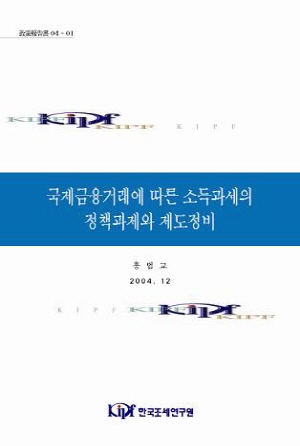국제금융거래에 따른 소득과세의 정책과제와 제도정비
- Keyword
- 소득귀속, 소득귀속, 고정사업장, 위험전가거래, 고정사업장, 위험전가거래
- Title
- 국제금융거래에 따른 소득과세의 정책과제와 제도정비
An Essay on the Attribution of Profits from Global Trading of Financial Instruments to Permanent Establishments
- Authors
- 홍범교; Beom-Gyo Hong; Beom-Gyo Hong
- Issue Date
- 2004-12-01
2004-12-01
- Publisher
- KIPF
KIPF
- Page
- pp. 165
pp. 165
- Abstract
- 1990년대에 들어서면서 통신기술의 발달에 따라 전세계를 커버하는 24시간 거래가 이루어지기 시작하였고, 오늘날에는 다국적 금융회사의 존재를 세계각지에서 확인할 수 있다. 이러한 금융회사들이 글로벌 트레이딩에서 벌어들이는 소득에 대하여 각 거래거점별로 어떻게 이를 귀속시킬 것인가 하는 문제가 당면과제로 제기되기 시작하였다.
이에 따라 OECD에서는 파생상품 및 유가증권의 24시간 거래에 따른 소득의 귀속문제에 대하여 검토하고 있다. 24시간 글로벌 트레이딩은 크게 3가지 유형으로 나눌 수 있는데 그 가운데 분리기업모델이나 중앙집중형 관리모델에서는 소득의 귀속에 있어 이전가격세제의 전통적인 가격기준법을 사용할 수 있으나, 통합거래모델에서는 핵심적인 기능들을 분리하기 어렵기 때문에 이익분할법을 사용하는 것이 보다 적절하다고 지적하고 있다. 또한 글로벌 금융거래의 고정사업장 개념과 관련하여 기능분석 및 실무분석을 통하여 자본과 인적기능의 기여도를 분석하여 이에 따라 각 거래거점에 소득을 분할 귀속시킬 것을 제안하고 있다.
국제적인 논의를 바탕으로 추출할 수 있는 국제금융거래 소득과세의 정책과제로는 다음과 같은 것들을 들 수 있겠다. 첫째, 국제금융거래에 있어 고정사업장의 개념을 어떻게 적용할 것인가 둘째, 종속대리인 고정사업장의 소득 귀속은 어떻게 처리할 것인가 셋째, 소득 귀속을 위한 요소들에 대한 보상의 구체적 결정은 어떻게 할 것인가 넷째, 국제금융거래에서 통상적으로 일어나는 금융그룹 내부의 위험전가거래의 처리는 어떻게 할 것인가 다섯째, 글로벌 트레이딩에서 이익분할법이 사용될 경우, 손실의 분담은 어떻게 처리할 것인가 여섯째, 독립기업원칙의 대안으로서 단일기업과세제도의 도입에 대해서는 어떻게 대응할 것인가 등이다.
OECD 회원국이 대부분 유럽국가인 것을 고려한다면 다소 역설적일 수 있으나, OECD의 공식적인 입장과는 달리 유럽에서는 역내에서의 경제통합의 정도가 심해짐에 따라 단일기업과세제도에 대한 논의가 탄력을 얻어가고 있다. 물론 단일기업과세제도의 실시에도 정치적이며 현실적인 어려움들이 남아 있지만, 적어도 유럽에서는 머지않은 시기에 가시적인 가능성이 보일 것으로 판단된다.
OECD의 논의에서 우리가 얻을 수 있는 시사점은 24시간 거래에서 얻는 국제금융소득의 배분에 있어 자본의 역할이 매우 강조되고 있다는 점이다. 또한 소득 귀속을 위한 기능분석을 행함에 있어 판매나 마케팅 기능보다는 트레이딩과 위험관리 기능을 매우 중요하게 취급하고 있다는 점이다. 이 두 가지는 서로 연관되는 것으로서 금융허브로서의 역할을 하지 못하고 있는 우리나라의 입장에서는 과세할 소득이 별로 생기지 못한다는 것을 의미한다. OECD의 논의가 국제적인 규범을 제정하는 것은 아니라고 하더라도, 그 논의 결과가 향후의 지침을 제공한다는 측면에서 이러한 논의방향의 귀결은 우리와 같은 후발 자본주의 국가들에게는 불리할 수밖에 없다.
이전가격세제와 관련된 제도 개선의 측면에서 본다면 국내의 관련 법규정을 보다 구체화하려는 노력이 필요할 것이다. 세법이 보다 정교하지 못함에서 오는 적용의 유연성은 과세당국의 몫이고, 납세자의 입장에서는 불확실성만 확대되어 보일 것이기 때문이다. 그렇다고 국제조세관련 법령은 아무래도 국제적인 거래와 관련이 있기 때문에 우리나라 단독으로 정비해 나가기에는 한계가 있는 것도 사실이다. 따라서 현재 국제적으로 제기되고 있는 관련 정책과제들에 대하여 보다 많은 관심과 연구가 필요하다.
보다 미래지향적인 시각으로 본다면 단일기업과세제도의 도입 가능성에 대해서도 대비하여야 할 것이다. 우리의 입장에서는 새로운 논의 주제에 대하여 그 논의가 우리에게 유리하게 진행될 수 있도록 준비하고 노력해야 할 것이다. 예를 들면, 우리나라의 국제금융거래 유형을 고려하고 향후의 발전 가능성을 고려할 때 단일기업과세제도에서 채택될 요소에 대하여 어 떠한 선택을 할 것인가 등을 미리 연구하고 최선의 대안을 찾는 것이다. 국제조세는 ‘협상’이니만큼 협상력을 뒷받침할 수 있는 우리의 금융 역량의 내실화와 함께, 국제적으로 진행되고 있는 글로벌 세제의 공통적인 전형을 위한 노력에도 적극적으로 동참하여야 할 것이다.
Since the beginning of the 1990s, the 24 hour-based global trading of financial instruments began to flourish over the world. Today it is not difficult to find the presence of those multinational financial enterprises operating in various places of the world. These multinational financial enterprises like investment banks are making a huge sum of financial profits from the global trading of financial derivatives and other financial instruments. Hence the attribution of these profits to permanent establishments has become one of the most important issues to be addressed from the perspective of international taxation.
OECD is currently taking on this issue with taxing authorities of its member countries and international financial powerhouses. Basically functional analysis and factual analysis will be the criteria for the attributions. The role of capital/risk assumption and the function of risk management are emphasized to be the most important factors in their contribution to profit making.
We can derive some policy issues from the OECD discussion on this matter. First, the concept of permanent establishment should be properly defined for these kinds of financial trading. Second, the ways to attribute profits to dependent agent PE should be clearly harmonized. Third, the way to choose the best method rule for the attribution of profits should be refined. Fourth, the ways to hedge the risks within the financial group should be consistently dealt with. Fifth, when the profit split method is applied, how to share the losses should be addressed. Sixth, we have to reevaluate the unitary taxation as an alternative for the current transfer pricing system.
The emphasis on capital in the attribution of profits is not a favorable factor for less-capitalized countries like Korea. Because Korean financial companies are not yet the equals to international financial powerhouses, nor is Korea yet suitable for a regional financial hub like Hong Kong or Singapore.
Notwithstanding the Korean government should be more specific in providing guidance on transfer pricing by revising the Adjustment of International Taxes Act. Because the discussion at the OECD on the attribution of profits is not concluded, it is not easy to refine the system. But to reduce the uncertainty facing the global players are one of the goals of Korean government to meet the global standard and it also is a desirable policy direction.
Korean tax authorities also had better be prepared for the introduction of unitary taxation system, though it may take some time to be realized. The current system based on Arm's Length Principle shows a lot of problems in actual application. Economically integrated European countries are showing renewed interest on the unitary taxation system. The pros and cons of unitary taxation should be studied and the best strategic road map for the Korean tax authorities should be carefully managed. The minimum effort to achieve those goals is an active participation in international tax fora.
- Keywords
- 소득귀속, 소득귀속, 고정사업장, 위험전가거래, 고정사업장, 위험전가거래
